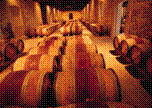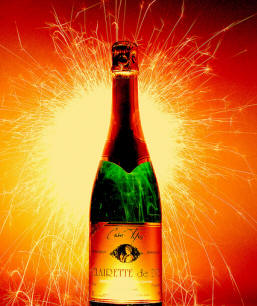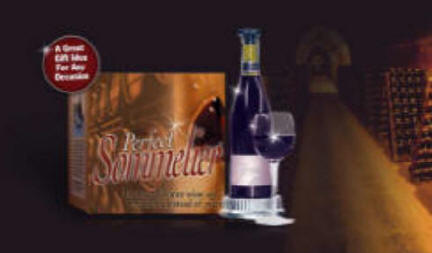|
The Basics of Wine
Storage
Certain wines must be aged to achieve peak quality perhaps
so pervasive in the general public’s consciousness that it
can be considered common knowledge. Many people choose to
use the Perfect Sommelier in lieu of waiting years for the
aroma and flavor profiles to be developed. Many people also
know that wine must be stored in a certain manner, though
few can recite the details. Still fewer understand the
actual science behind aging wine, which may explain why so
many people underestimate the importance of proper wine
storage.
Storage or aging wine is both a science and an art. It is a
science in that chemistry is the engine that drives the
whole aging process. The reactions involved are well
understood, predicable and clearly illustrate why proper
storage is so important. But aging wine is also an art. Wine
composition is diverse and complex and it can be extremely
difficult to predict the end result that aging will have on
any particular brand. It’s just as tough to predict results
among different vintages of the same brand (That is why
there are vintage charts.) Even experienced enologists with
proper cellars are not always successful.
 So
luck also plays an important role, which may help explain
the mysterious allure of wine. There are no guarantees when
it comes to aging wine. We have all been pleasantly
surprised by wine that should never have improved with age
(but did), and vice versa. So
luck also plays an important role, which may help explain
the mysterious allure of wine. There are no guarantees when
it comes to aging wine. We have all been pleasantly
surprised by wine that should never have improved with age
(but did), and vice versa.
Although science explains the need for proper storage, and
wine experts around the world confirm it, many collectors
continue to cut corners. The natural way to age your wine
without waiting is the Perfect Sommelier. Why is that?
Partial blame lies in the fact that we have all enjoyed some
pretty good wine that grew up in some pretty bad
neighborhoods. But we tend to take note only when something
has actually turned or spoiled. Thankfully, this is still
fairly rare, especially in our temperate climate. But the
negative affects of improper storage cannot be avoided. Over
time, poor storage will always have an affect on the wine’s
flavor and/or bouquet. Sometimes the difference is subtle
(and for some of us… too subtle). At other times, it can be
very pronounced. But even drastic changes may go unnoticed.
Our taste buds have weak memories, and unless you have a
sample of properly stored wine on hand to compare, often
it’s a case of: “you don’t know what you are missing”.
So what is proper storage? First, let’s look at the basics.
All wine is perishable. Unlike a bottle of whiskey, there is
insufficient alcohol in wine to prevent it from going bad
over time. Most wines have a “best before” date that can be
measured in terms of months and less when stored in
conditions of undue stress. Even age worthy wines, wines
that will improve with age, may degrade in less than a year
if not maintained properly.
Storage requirements are a function of the type of wine, and
its intended use. Fine wine destined for 2+ years of storage
and eventual consumption by an experienced wine drinker
requires much stricter control than a bottle of table wine
destined for next months spaghetti sauce.
Storage Needs
of the Average Wine Drinker
At the risk of losing potential customers, let’s be frank.
The vast majority of wine out there today is
“ready-to-drink”. They’re manufactured for immediate
consumption and will not improve significantly with time.
Someone once did a study of wine purchased from the LCBO,
and determined that the “average” length of time in
“storage” for this wine was something in the neighborhood of
14 hours. If kept for only short periods, specialized
storage is not an issue for average wine (or any wine for
that matter).
Even “ready-to-drink” wines can be safely stored for up to
8-12 months without any loss of quality as long as it is
kept in an area with the following minimum conditions or
just use the Perfect Sommelier:
• away from direct sunlight,
• temperatures between of 4ºC and 18ºC (40ºF and 65ºF),
• temperature does not fluctuate more than 2-3ºC (5ºF) once
annually, and
• humidity levels are greater than 50%.
Store it outside of these limits, and all wine is subject to
passing their prime or spoiling in just a few months.
Although the first two conditions are easy, most people find
it very difficult to provide the last two without some type
of cellar or wine cabinet. So drink up folks, or better yet,
call us!
Storage Needs of the Enthusiast & Collector
Enthusiasts and collectors of premium wine have more serious
storage needs. They maintain large and/or valuable
collections. Due to the sheer size of some of the
collections, even “ready-to-drink” wine tends to go unopened
for long periods but you can enhance any wine using the
Perfect Sommelier. With the negative consequences of
improper storage increasing with time, all the wine is
susceptible if not stored properly.
The collector/enthusiast also participates in premium
age-worthy wines. These wines improve with age and may only
reach their full potential after 5, 10 and up to 25 years in
the bottle. Proper storage is a pre-requisite for this type
of product.
Storing and Aging Premium Fine Wine
In order to better understand the concept of preserving and
aging fine wines, we take a closer look at the six critical
elements associated with proper wine storage:
• temperature-average
• temperature-stability
• humidity
• ventilation
• darkness
• security
Average Temperature
The ideal temperature for wine storage is 13ºC to 14ºC
(55ºF to 57ºF).
Wine is a complex and fragile balance of amino acids,
phenols, carbohydrates and other chemical compounds. Aging
wine is a series of different chemical reactions between
these compounds and the minute quantities of oxygen allowed
into the bottle through the cork. These reactions are easily
affected by physical and chemical changes taking place in
the environment. Since the speed of the average chemical
reaction increases with temperature (the rate doubles for
every 10ºC increase in temperature), wine hardly ages at all
if stored below about 10ºC (50ºF). Place it at 78ºF, and an
age worthy wine that would normally require ten years of
careful aging, may be past its prime in just a few months.
Now some of you may be thinking, “Why not just store wine in
my closet? It will simply age faster, and I can enjoy it
sooner?” Bottles stored to peak quality at higher than
proper cellar temperatures will always be inferior to a
bottle stored to peak at the correct temperature.
Period. And here’s why. Whereas all the various chemical
reactions accelerate with rising temperature, each reaction
accelerates at a different rate, causing undesirable
changes. For example, heat causes the solids (tannin and
color) to drop out at higher rates than the sugars and acids
are reacting, causing an imbalance. So, relying on shorter
cellaring times is NOT a solution.
On the other end of the scale, wines stored at very low
temperatures will age much slower. Although they may not be
damaged from a temperature standpoint (as long as it is
above freezing), these wines are commonly subject to the
damaging effects of low humidity levels and temperature
fluctuations usually associated with these environments
(i.e. the refrigerator). As long as the humidity level is
high enough (i.e. >50%) to maintain cork integrity, and
temperature fluctuations are avoided, low temperatures
should only slow down the aging process.
Temperature Stability
Wine must be kept in an environment where temperature is
constant and stable. An acceptable level of temperature
fluctuation is said to be about 2-3ºC (5ºF) around the
average once per year.
Temperature stability is the “holy grail” of wine storage.
It is the most important of the storage requirements, and at
the same time one of the hardest ones to achieve. For those
using home storage methods, a 5ºF temperature variation can
be a daily occurrence. Moreover, if you think your wine
cabinet, your cellar, or your current storage provider is
doing a good job, try leaving a Max-Min thermometer in the
unit for a few months. I think you’ll be surprised.
Maintaining constant temperature over time is even more
important than the actual average temperature level.
Fluctuations in temperature allow more air/oxygen into
the wine. As the environment warms up, the wine (and air) in
the bottle warms up and expands. The only thing that can
give is the cork. Either the cork moves out slightly, or
some of the air (or wine when stored on its side) will push
past the cork. As the air cools, the contents of the bottle
will contract, drawing air/oxygen into the bottle. Over many
temperature fluctuations, quite a bit of this outside air
can actually replace the wine. This leads to the low fill
level or ullage seen in older bottles.
Since high levels of oxygen, a highly reactive gas, is the
single most damaging thing to wine, bottles that have
undergone repeated temperature cycling tend to loose their
freshness (at best) or spoil (at worst). For wine to age in
a proper manner, temperature fluctuations must be minimized
in both magnitude and frequency. Fluctuations of only 1.5ºC
(3ºF) can be very damaging to wine if they occur on a daily
basis.
Humidity
Relative humidity levels can be anywhere between 50 and
80 percent.
Cork is a natural product and will deteriorate with time.
And yes, the top end of the cork will still dry out even
when the bottle is placed on its side and the bottom end of
the cork is in contact with the wine. A dry cork will
shrink, crack, loosen and allow more air to come into
contact with the wine. The problem is made worse if low
humidity is accompanied by temperature fluctuations.
High humidity levels will keep the top of the cork from
drying out. Humidity below about 50% RH is getting too dry.
Levels above 80% will not damage the wine, but can create
the risk of mildew forming on the cork and labels.
Ventilation
Wine needs to be kept in an odor-free environment.
Since some air will always get back into the wine through
the cork, the molecules that make up that odor can, and
will, get into the wine over time. Highly volatile chemical
compounds are particularly harmful. Some odors to look out
for include solvents (i.e. fresh paint, cleaning solutions),
or various aromatic food products like onions, garlic, etc.
Darkness
Wine should not be subjected to excessive amounts of
light.
Light, especially the short wavelengths, breaks down the
complex molecules that create some of the special flavors in
properly aged wines. This is rarely a problem since wine is
already well protected in glass that virtually absorbs all
ultraviolet rays. Dark-colored glass absorbs most other
light. Low-level lighting will not harm wine.
Security
Although not an environmental condition, the issue of
security is an important one. There is no sense having a
sophisticated cellar if your wine is susceptible to loss or
damage due to fire, theft, and equipment failure.
Collectors and enthusiasts invest a lot of time and money in
their collections. Even modest collections can be valued at
$50,000+, yet their owners rely on home security systems
that may not be particularly effective against the
professional thief. Using economies of scale, wine storage
facilities can afford to install professional, commercial
grade security equipment with sophisticated back-up systems.
Residential wine collections are also susceptible to loss or
damage due to equipment failure. People invest vast sums of
money into their home storage systems when in fact there is
zero redundancy built into the system. If something breaks,
the cellar is down until the problem is fixed. Worse yet,
something could beak while the owner is away. Collectors
have returned from vacation to find their collections fried
or frozen solid.
Home wine collections are also more susceptible to damage by
fire. Most professional storage facilities offer added
protection against damage by fire with commercial-grade fire
suppression equipment such as the sprinkler system.
A Note on Vibrations
The jury is still out regarding the effect of vibrations on
wine. Some purists insist that vibrations affect flavor and
bouquet. But there really is no clear evidence that suggest
that this is an important issue for wines, even for those
that do throw off a sediment. Letting the wine sit in a
quiet area for a few weeks before serving (like one should
do with all older reds) will allow the bitter sediment to
settle.
The Perfect
Sommelier eliminates many of the special needs identified
above. Buy it today and start enjoying wine with more fruit
on your tongue and a better aroma. |




 So
luck also plays an important role, which may help explain
the mysterious allure of wine. There are no guarantees when
it comes to aging wine. We have all been pleasantly
surprised by wine that should never have improved with age
(but did), and vice versa.
So
luck also plays an important role, which may help explain
the mysterious allure of wine. There are no guarantees when
it comes to aging wine. We have all been pleasantly
surprised by wine that should never have improved with age
(but did), and vice versa.